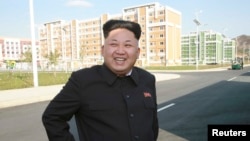Former U.S. government officials say the release of an American who had been detained in North Korea for nearly six months is not likely to significantly affect relations between Washington and Pyongyang.
Jeffrey Fowle was released and sent home earlier this week, returning to his home in the state of Ohio. North Korea’s official media said leader Kim Jong Un had personally ordered Fowle’s release following repeated requests from U.S. President Barack Obama.
But there are still two more Americans being held in the North, and Pyongyang has denied Washington’s repeated calls for their release.
Robert Einhorn, former State Department Special Advisor for Non-proliferation and Arms Control, told VOA it is too soon to tell how this move will play out. “Presumably, [the release] is designed to signal something, but what it is designed to signal is hard to tell at this stage,” he said. “We have to wait and see.”
Joseph DeTrani, a longtime North Korea watcher and the former director of the U.S. National Counterproliferation Center, views Fowle’s release as Pyongyang reaching out to Washington. “In this case, Kim Jong Un has taken that responsibility of releasing Jeffrey Fowle, which was a positive decision,” said DeTrani.
DeTrani added it is reassuring that North Korea released the detainee without a high-ranking U.S. envoy visiting the country.
The United States has welcomed the North’s move, calling it a “positive decision.” But State Department spokeswoman Marie Harf said, “We remain focused on the continued detention of Kenneth Bae and Matthew Miller, and again call on the DPRK to immediately release them."
The unexpected release of Fowle is not likely to provide a breakthrough in relations according to Mitchell Reiss, a former State Department official. “I would be very hesitant to draw any sweeping conclusions that this is the beginning of a new type of relationship,” Reiss said.
Gary Samore, the former White House Coordinator for Arms Control and Weapons of Mass Destruction, suspects the release might be Pyongyang’s effort to resume talks with Washington in an attempt to get economic benefits from Washington.
“I think the North Koreans would like to resume negotiations with the United States, mainly in order to reduce their dependence on China and to find additional sources of food, fuel, and other material benefits for the regime,” said Samore.
The Obama administration will continue to put pressure on the North for the release of two other Americans being held there, Bae and Miller. They were convicted of committing “acts hostile to the regime” and were sentenced to years of hard labor.
Jee Abbey Lee contributed to this report, which was produced in collaboration with the VOA Korean service.










